We recently completed another germination experiment involving cilantro seeds. A single packet was divided in two, resulting in exactly 83 seeds for each “test plate.” The germination experiment ran 5 days, from the 12th to the 19th of September, 2015. The goal is to see if Hydreva treated water consistently creates improved seed germination. As with our recent chard seed germination experiment, the result was a resounding “Yes!”
While we’re experts in the new science of structured water technology, we’re only gradually becoming experts in … seed germination tests (: Seeds, as with Nature in general, have tremendous inbuilt intelligence and discretion. This is prelude to admitting that the overall germination rate for both test plates, during the test period, was low (around 40%). Commercial seed, according to this article by the Maine Organic Farmers & Gardeners Association, typically have average germination rates around 65%.
We could have run our experiment longer and, of course, germination results would have progressed. But, many factors affect germination. Seeds with harder shells – like cilantro – typically require more time to germinate, but any seeds may simply be finicky and require unique conditions. Factors in seed germination include temperature, access to air, light exposure, soil composition, mineral content, moisture and pH. Furthermore, via their internal programming, seeds are sensitive to combinations and patterns of such elements.
The Hydreva cilantro seed plate had a higher germination rate than the plate given regular water, but the primary difference in results involved how quickly the Hydreva seeds shot past the others once “hatched.” The tendrils of all germinated seeds were measured and classified into four groups; tiny, small, medium, large. Respectively, these had tendrils under 1/4″, from 1/4″ to 1/2″, 1/2″ to 1″ and over 1″. Thus classified, the Hydreva plate had 19 seeds in the medium and large categories while the regular water plate had only 3 seeds in these categories – a 6x difference!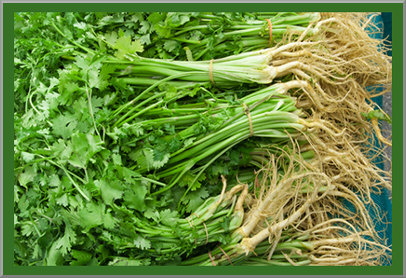
As our seed germination experiments progress – they’ve just begun them this month (Sept. 2015) – we expect more sophisticated, definitive and quantitatively significant results. Already, there’s proof that Hydreva consistently and dramatically improves seed germination results. Meanwhile, if seeds benefit from Hydreva water this much, what are the chances similar benefits are not delivered throughout the growth cycle?
As with our recent chard seed experiment, once again, the Hydreva seeds were stark white whereas the regular seed tendrils had a brownish tint. The Hydreva tendrils were also thicker and more developed. It’s clear that this brownish tint involves fungal growth and mold (some of which was stuck to the paper towel covering the seeds). The seeds remained wet or moist throughout the 5 day experiment. The higher vibrational frequency and energy level of the Hydreva water – this has been proven via many water treatment tests over the past decade – is “incompatible” with the growth of fungal organisms and pathogenic bacteria.
Imagine how colossal this benefit will be in the worlds of gardening and agriculture. A major cause of crop failure and reduced yield associates with fungal attack on plant roots. If a water treatment method substantially reduces this susceptibility, it will translate into greater yields and plant health across the board. In addition, Hydreva substantially improves the ability of plant tissue to assimilate nutrients, with even greater implications for yields and plant health.
Here are the 5 day cilantro seed germination results and photos.
| Regular water | Hydreva water | |
| Tiny (< 1/4″ tendril) | 21 | 10 |
| Small (1/4″ to 1/2″ tendril) | 6 | 7 |
| Medium (1/2″ to 1″ tendril) | 3 | 11 |
| Large (> 1″ tendril) | 0 | 8 |
| Total | 30 | 36 |
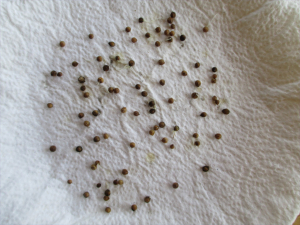
Regular water seeds |
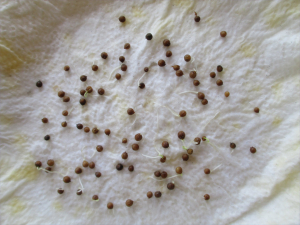
Hydreva water seeds |
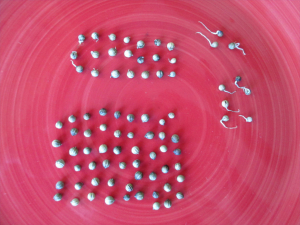
Regular water seeds |
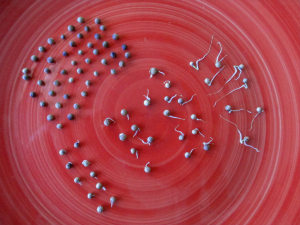
Hydreva water seeds |
